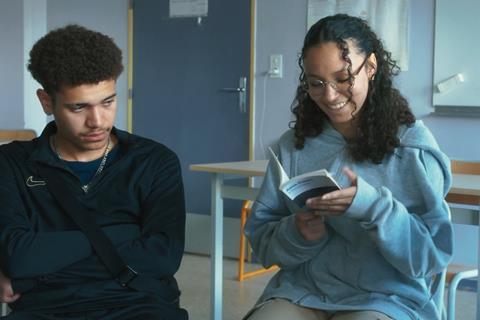DOK Leipzig’s opening film explores how modern French teenagers respond to Ernaux’s body of work

Dir. Claire Simon. France. 2025. 90mins
A published writer for over 50 years, French author Annie Ernaux already enjoyed a hefty critical reputation before her international renown rocketed in 2022, when she became the first French woman to be awarded the Nobel Prize for Literature. Exactly what has made Ernaux’s writing so meaningful to a wide readership over two generations has now been illuminated by French documentarist Claire Simon.
Students talk intelligently about Ernaux’s writing
In an unapologetically no-frills way, Writing Life: Annie Ernaux Through The Eyes Of High School Students shows teenagers responding keenly and insightfully to a range of Ernaux’s writing. The result is very much a specialist offering, as you might expect from a film consisting largely of commentaries on literary texts; yet it is a highly involving work and, given the current Ernaux boom – including a raft of English-language translations, and a successful London stage adaptation of her book The Years – Simon’s film should continue to spark niche interest following a spate of festival berths, including a Venice premiere and the DOK Leipzig opening slot.
Filming at a range of schools in mainland France as well as Cayenne in French Guiana, Simon allows the students themselves, with little prompting from either herself or their teachers, to shed light on the writer’s work and what it means to them. Discussion takes place in a range of settings, from formal classrooms to parks and other outdoor spaces. A wide range of Ernaux works are covered, including the novellas Simple Passion and Happening (both filmed, by Danielle Arbid and Audrey Diwan respectively; the latter resulting in a Venice Golden Lion win).
Ernaux’s writing has focused on her own experience from childhood onwards, with special emphasis on certain painful episodes including her abortion while a student and an obsessive romantic relationship, It also contemplates her working-class background and her relationship with her parents. What makes her works particularly accessible is her use of what she calls ‘flat writing’, a style devised to recount her memories in a direct, uninflected way – the nature and effects of which the students here discuss very perceptively. Simon herself similarly uses an unobtrusive observational style to involving effect, as in previous works including The Competition (about film school La Femis) and 2023’s Our Body (about women and the French health system).
Here, students talk intelligently about Ernaux’s writing (both content and style) and convey the intensity with which they find themselves relating to her experience. One boy relates Ernaux’s own social mobility to the experience of his Portuguese immigrant parents. In Cayenne, a discussion of Ernaux’s direct writing style leads some students to explain the expressive power of their own Haitian Creole language.
What may startle non-French viewers is the degree of frankness evident in both Ernaux’s work and the classrooms, with the students discussing texts that address very adult themes – among them, loss of virginity and sexual violence – in graphic style. Few participants show discomfort or embarrassment, although one girl is firm in her conviction that the obsessive nature of A Simple Passion simply “goes too far”. But at a time when an ever-broader range of texts is being banned in US school libraries, you have to admire the open-minded maturity of the French school system – paritcularly bearing in mind that France too faces the pressures of intolerance, with a brief sequence showing one school observing a moment of silence for two French teachers killed in jihadist attacks.
Simon – only occasionally evident as an offscreen questioning presence – has clearly been somewhat selective in choosing scenes in which the discussion really takes off. But the students’ acuity and articulacy impress throughout, as does the strength of their own connection with Ernaux’s work.
Production companies: Rosebud Productions, France Télévisions
International sales: Be For Films, sales@beforfilms.com
Producers: Emmanuel Perreau, Michel Klein
Screenplay: Claire Simon
Cinematography: Claire Simon
Editor: Luc Forveille























